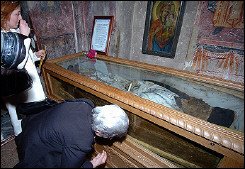Exhumed Orthodox Monk's Body Incorrupt
 From Yahoo News.
From Yahoo News.As Greek churchgoers prepare for Orthodox Easter this weekend, a simple monk who died 15 years ago but has not decomposed is stealing the show from the usual solemn ritual.
The discovery that Vissarionas Korkoliakos remains largely preserved -- along with his monastic robes and book of Gospels -- is being hailed as a "sign", in a country strong on religious tradition that loves miracles.
"Even (his) soft parts are intact," exclaimed the region's senior cleric, Bishop Nicholas of Fthiotis, as the Greek Orthodox Church officially deemed the event a "celestial sign, a message for our people and our time."
[…] Given the fervor, the church decided to keep the corpse on public view, drawing criticism from some clerics who fear the monk's exposure will lead to commercial exploitation and have called for his reburial.
It all started when the body was exhumed "uncorrupted" -- in church parlance -- during repairs to the brick wall of his crypt at Agathonos Monastery, where he died in 1991 at age 83.
[…] Just as in Sweden people might seek support in the social welfare system, Greeks place their faith in the church, he said.
He suggested the Vissarionas craze might be "a sign of a poor education level...and also indicates a population that is easily influenced."
Of course. Those poor, pathetic, stupid, ignorant Christians. They’d be so much better off to put their faith in the hands of the Welfare State, like the Swedes. Where your treasure is, there will your heart be also (Matt. 6:21, RSV). If your treasure is entrusted to the government, then your trust will be placed in the government. God help you.
Other researchers are less dismissive.
"Miracles are a personal matter for each individual," said one Greek anthropologist who declined to be named. "These are very sensitive matters."
"Many Orthodox believers say that the bones of a holy person have a sweet fragrance," she said. "Yet Greek folk culture also maintains that a body can fail to decompose because of a curse."
[…] Fakelas said the craze over the late monk can also be interpreted as a popular backlash against a spate of sex and corruption scandals that recently rocked the Church of Greece, tarnishing its image.
"I'm told that as a monk, Vissarionas would leave the monastery and seek to help the needy," he said.
Today "the popular perception surrounding bishops, on the other hand, is that they are chauffeured around in limousines."
I don't know enough about this case to have an opinion on its validity, but I reject the temptation to ask when was the last time an Episcopal bishop was found to be incorrupt (let alone a dead Episcopal bishop). I refuse to take shots at my old denomination. I won’t say it. I won’t, I won’t, I won’t...










<< Home